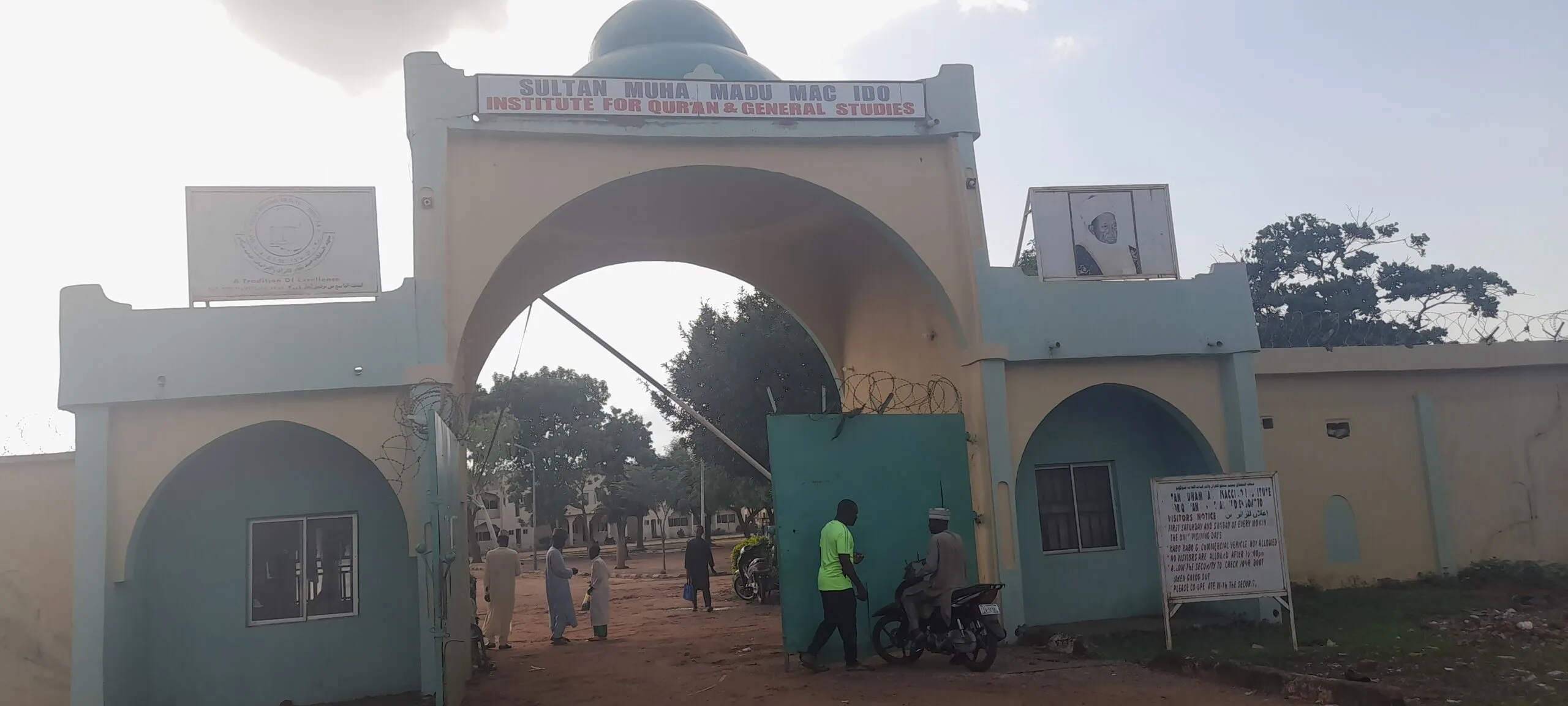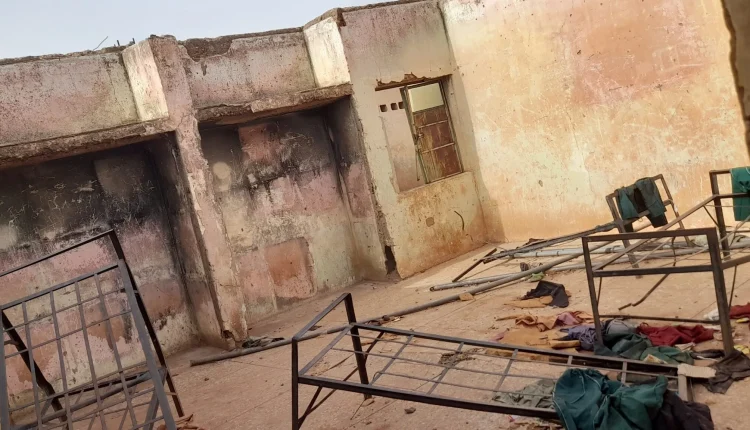Sokoto School in Shambles: Students, staff decry appalling conditions
Sokoto School in Shambles: Students, staff decry appalling conditions
The school’s infrastructure tells a dismal story, with leaking roofs, worn-out doorways, doorless entries, gutted buildings in the primary section that need attention, and inadequate facilities.
On a warm Wednesday morning in July, everyone at the Sultan Maccido Institute for Qur’anic and General Studies School, Sokoto, was engrossed in their daily activities.

As commercial motorcyclists moved in and out through the guarded school entrance, students shuffled into their classrooms. Among them were SS3 students preparing for their exams under challenging conditions.
The school’s infrastructure is dilapidated. Most of the buildings have damaged and leaky roofs, dilapidated window-less walls, broken doors, and worn-out doorways.

Faruq Yabo, who doubles as the quality assurance officer and biology teacher, could not hide his dismay over the poor school infrastructure, including the hostels.
“The school is not in good condition. Especially during the rainy season, you cannot think a student can sleep there (hostel),” Mr Yabo told UDEME. “For learning to be successful, it must take place in a conducive environment. Since the establishment of the school, there has been no drainage in the staff quarters.”
Mr Yabo said that before the arrival of the new director of the institute, Abubakar Haji, “Things were worse than the current status, but the director put some things in place, which included light in the classrooms and administrative block as we await the government intervention”.
“There was one time when the committee from the Government House came to visit the school and saw all the sections, which include the male, female and primary sections, and they promised that very soon the school would be in the next project,” Mr Yabo recalled.
Many students expressed their frustrations with the condition of the facilities. They asked not to be named for fear of victimisation.
“I started in this school in SS1, and it wasn’t as bad as it is now,” one student said. “We used to have globes (light bulbs) and fans, but not anymore. Although we have enough chairs in the classrooms, the hostels are barely habitable.”

He detailed the struggles students face during the rainy season.
“All the hostel rooms leak, so students move their belongings to dry areas and use buckets to collect water from the leaking roofs,” he said.
Challenges
The students said they mop and clean the dormitories after every rain.
“The rain affects our sleep and studies whenever it falls at night, making it hard to prepare for early morning classes,” another student said. He pleaded with the government to provide roofing materials, equipment and a conducive environment to prevent cholera outbreaks “like the one we experienced two to three years ago due to lack of potable water.”
Another student highlighted the severe challenges in the hostels and said they sometimes sleep outside.
“When it rains, water enters our rooms. The mattresses are torn, the light is unstable, there is no fan, and some classes still use poor blackboards. We need proper sleeping arrangements and better facilities,” he said.
Education in Nigerian context
According to the International Journal of Scientific Research in Education, many schools in Nigeria need facility upgrades. Over the years, the Nigerian government has failed to meet UNESCO’s recommendation for developing countries to allocate 15 per cent of their budget to the education sector.
This persistent underfunding has resulted in substandard learning environments, inadequate teaching facilities, and understaffed schools.
Although Sokoto State allocates over 16 per cent of its budget to education, the failure of the state government to release details of actual money released limits accountability.
According to data from the Centre for Social Justice, in 2020, Sokoto’s total budget was N202.4 billion, with N43.6 billion (21.5 per cent) allocated to education. In 2021, the total budget dropped to N176.7 billion, with education allocation decreasing to N25.9 billion (14.7 per cent). In 2022, the total budget was N188.4 billion while the amount allocated to education was N31.2 billion (16.6 per cent). In 2023, the total budget rose to N198.5 billion, with N33.5 billion (16.9%) allocated to education.
The inadequate funding of public education has caused many Sokoto residents to turn to private schools.
In Sokoto, like in many other parts of Nigeria, hundreds of private schools have been established to complement public education. Overall, the private schools are better managed, but many residents cannot afford them for their wards.
Muritala Yusuf, an education lecturer at the Usmanu Danfodiyo University, Sokoto, said good learning can only occur in a resourced and conducive environment.
“If the classroom is not appealing and conducive, you cannot learn. An environment without required resources for learning will pose a problem of out-of-school children and poor academic outcomes,” he said.
Mr Yusuf said because Nigerians emphasise certification, students just want to graduate regardless of the deplorable conditions of their schools.
“Most public secondary and primary schools are dead; the government succeeded in killing them because of this attitude. We plead with the government, philanthropists and NGOs to revitalise schools. Education is an important tool for personal and societal development,” he added.
In a report, Muhammed Ibrahim, a professor at the Department of Curriculum Studies and Educational Technology at Usmanu Danfodiyo University in Sokoto State, said allocations to the education sector fall short of the resources needed for growth.
Apart from low budgetary allocation, allocated funds are often not released, leaving many schools like Sultan Maccido Institute with sub-par facilities and deplorable conditions.
Allocated funds for repairs
According to the 2021 Sokoto State budget, N60 million was allocated for renovating 15 blocks of classrooms and N10 million for hostel renovations in the school.
However, visits to the school in June and July this year revealed that no such repairs were made.
“The conditions are affecting the students’ learning. We hope for a total renovation of the school, including the library and central mosque,” the school’s director, Mr Haji, said. “The school last experienced renovation in 2008, about 16 years ago.”
The Sokoto State Ministry of Basic and Secondary Education refused to respond to our questions on the budgetary allocation.
Read Also: FASU Games: UNILAG basketball beat Nile University
On 30 July, UDEME sent a Freedom of Information (FOI) request to the office of the Permanent Secretary of Sokoto State Ministry of Basic and Secondary Education, Ibrahim Umar, seeking specific comments on the releases made for school projects, the amounts released, and the contractors for the projects.
The personal assistant to the permanent secretary, Naziru Ibrahim, acknowledged receipt of the letter with the message: “The Ministry will get back to you.”
However, as of the time of this report, the ministry has yet to respond, and Mr Ibragim has not answered subsequent calls.

Mr Haji, the school’s director, said many government promises made in the past were not redeemed, “but recently, they (the state government) visited the school, and we heard that the government is planning to renovate the school soon.”
Mr Yabo, the quality assurance officer, said the school’s lack of proper drainage had exacerbated the infrastructure challenges, with some houses at the staff quarters suffering from erosion during the rainy season.
“Since the establishment of the school, there has been no drainage in the staff quarters,” he told UDEME.
A staffer, Isah Muhammad, told UDEME that the hostels and the classrooms need windows, doors, chairs, ceilings and lockers.

Extracurricular Activities
Extracurricular activities like sports also suffer from the underfunding of the institute.
Abdulwahab Abubakar, the school’s Physical and Health education teacher, said the school needs sporting facilities.
“Regarding extracurricular activities like sports, many students are now focusing on football because of its cheapness and availability. We need sports facilities so that students can be actively involved in sporting activities. Sports should be promoted so that every student can have options and we (teachers) will be able to train them,” Mr Abubakar told UDEME.
UNICEF has stated that sports profoundly impact individuals by building their physical strength, mental confidence and independence. Its recent report revealed that participation in sports also enhances educational outcomes and develops crucial life skills, including leadership, self-esteem, and future success.
Mr Abubakar said the school also needs a health club.
“We also need a health club and a skills acquisition centre, particularly for science students to make something on their own. This will let the students be active and love the school more.”
Otuekong Akpaneto, a sports expert, said sport improves students’ mental workout and fosters teamwork and harmony.
“Sports are essential for students as they offer a mental workout; games like chess and football enhance cognitive skills. Moreover, sports bring students together, creating happiness, fostering harmony and teamwork, particularly when they share a common goal as teammates,” he said.(Premium Times)

